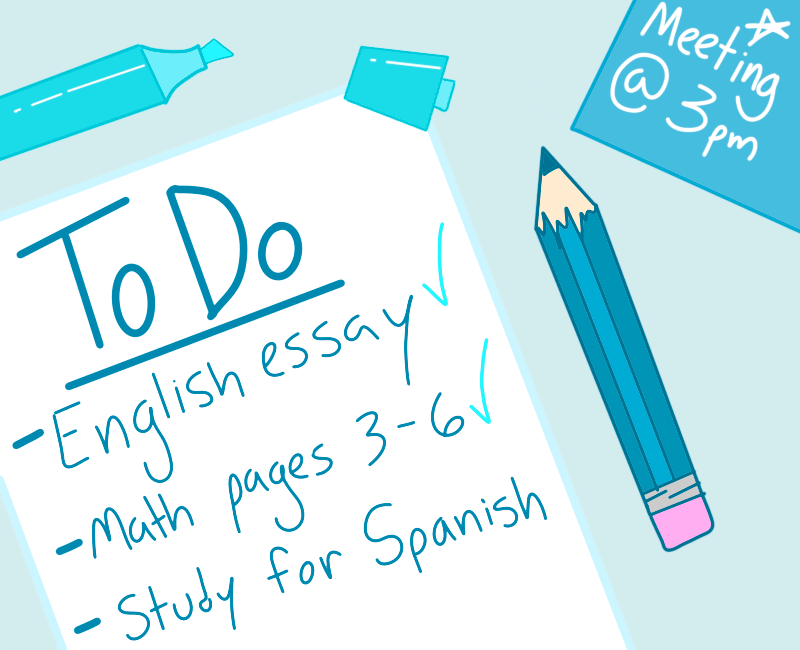Guidance for Greenhorns
How to Homework
Photo by Sarah Terletsky
The feeling of satisfaction when you write a check mark next to each assignment is another reason to get an agenda. Make sure you write down important dates too so you can manage your time.
Getting used to the routine of completing homework every day after school can be difficult, but it doesn’t have to be. These are some strategies I use on a regular basis to keep myself on track while working through a long list of assignments and studying for upcoming tests.
1. GET AN AGENDA!
It doesn’t matter where you get it or what you use, whether you find one with puppies on it at Staples, a small notebook at the Dollar General, or an app on your phone. As long as you have a designated place where you record upcoming due dates, club meetings, and whatever else you need. Even if you don’t have much to worry about since the school year has just started, eventually you probably will. It’s good to get into the habit of recording important dates and tasks because you will never be able to remember everything.
2. Make a schedule and allow yourself breaks
Sometimes it can be challenging to stay focused while completing assignments, even if you only have one. However, if you can’t get anything done except for becoming frustrated with yourself you should take a break. Pushing yourself too hard can easily lead to burnout, which prevents you from getting anything done anyway, so allow yourself 10 to 20 minutes to do something else. Engaging in something you genuinely enjoy or getting up and being active are great ways to take advantage of your relaxation time. This gives your brain the time to process overwhelming schoolwork, and the space to think creatively so you can return to your assignments with fresh ideas.
3. Establish a workspace
During quarantine I noticed that I had difficulty getting work done depending on where I was sitting. If I sat on my couch or bed, I would become sluggish and unproductive. On the other hand, if I sat at my desk or kitchen table, I would become significantly more efficient. Although sitting at a table or desk may not work for you, having a quiet designated working space with bright lighting and no distractions can help you establish a working mentality that you can tap into whenever you have a lot to do.
4. Google is your friend
Google and YouTube can be extremely helpful if you are struggling with a subject. That doesn’t mean you should just look up the answers and copy them because that won’t help you in the long term. Instead, look for videos and examples related to your challenging subject because not only can they reiterate what you have learned in class at a pace that works for you, but different teachers may also have a unique explanation that makes more sense to you than the method your teacher used in class.
5. Collaborate with your peers
Although some people loathe the idea of group work and prefer being independent, it can be productive if you find the right people. If you have reliable friends in your classes that can stay on task, then ask them questions during class or invite them to a study session after school in the school library. This allows you to share ideas, help one another, and offer any advice you may have in a comfortable environment where it may be easier to understand a fellow student’s perspective than formal lessons. However, if you find that during study sessions your group spends most of its time off topic and you’re getting nothing done, then you should either redirect their attention, find new people, or go back to working independently.
If you are looking for advice on a particular subject, please leave a comment so we can help you!





